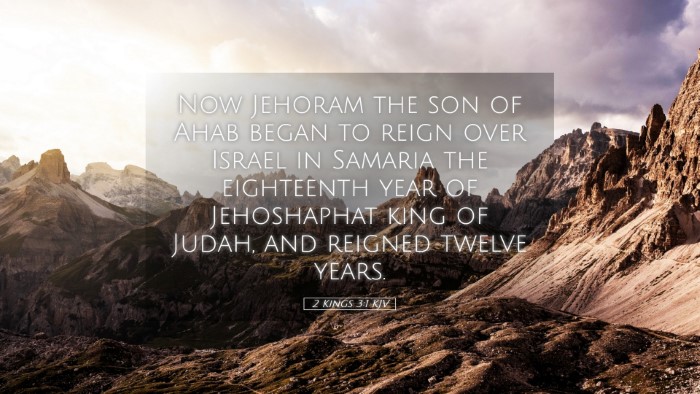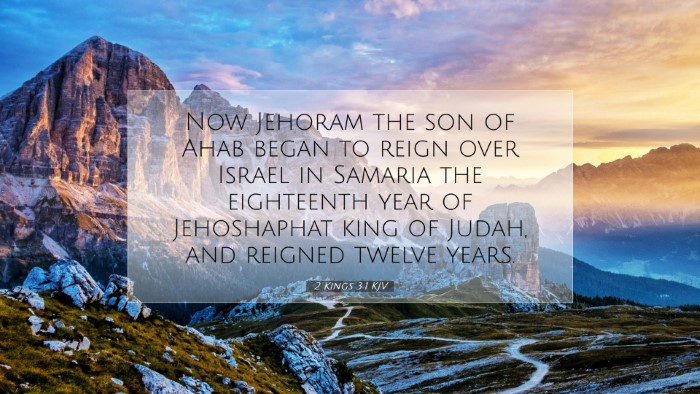Commentary on 2 Kings 3:1
Verse Summary: 2 Kings 3:1 states: "Now Jehoram the son of Ahab began to reign over Israel in Samaria the eighteenth year of Jehoshaphat king of Judah, and reigned twelve years."
Introduction
This passage marks a significant transition in Israel's monarchy, as Jehoram ascends the throne. His reign is noteworthy not just for its political implications but also for its spiritual context within the narrative of Israel and its kings.
Historical Context
Jehoram, the son of Ahab, represents the continuation of a dynasty that had already been marked by conflict and deviance from Yahweh's commandments. His reign falls during the period when Judah is ruled by King Jehoshaphat, known for his attempts to abide by God’s laws, contrasting sharply with Ahab’s legacy.
Insights from Matthew Henry
Matthew Henry remarks on Jehoram's rule as a period that encapsulates both the distress brought by idolatry and the looming judgments upon Israel. Jehoram attempted to steer a middle path, distancing himself from the more outright evil of his parents while not entirely rejecting the idolatrous practices prevalent in Israel. Henry notes:
- Jehoram's reign represents a compromise that could not lead to true reform.
- The significance of the timeline weakens the traditional prophetic warnings against idolatry.
Insights from Albert Barnes
Albert Barnes emphasizes the political dynamics of this verse. He notes the uneasy relations between the kingdoms of Israel and Judah during this period, which are defined not only by their monarchy but also by their individual approaches to worship and governance. Key points include:
- Jehoram’s ascent during Jehoshaphat's reign underlines a time of political alliance yet spiritual divergence.
- The mention of the duration of Jehoram's reign indicates a period of both hope and impending consequences.
Insights from Adam Clarke
Adam Clarke provides further contextual analysis, highlighting the impact of Jehoram’s reign on Israel. He details:
- The dangers of syncretism evident in Jehoram's attempt to merge the worship of Yahweh with pagan practices.
- His reign characterizes the broader trajectory of Israel towards destruction, showing the consequences of a divided heart.
Theological Implications
This verse invites deeper theological reflections. The dual-themed narrative of kingship juxtaposes human leadership with the sovereignty of God. It raises questions about the nature of leadership in the Kingdom of God, particularly how leaders can reflect divine will amidst societal pressures. Key theological insights include:
- The persistent tendency of leaders to compromise their beliefs to maintain power.
- The importance of aligning political actions with divine commandments.
Lessons for Today
For pastors, students, and theologians, this passage serves as an admonition against the pitfalls of leadership devoid of spiritual integrity. It compels contemporary leaders to reflect on their commitments to holy living in the face of cultural and political challenges.
Challenges for Modern Leaders
Reflecting on Jehoram's reign, leaders today must wrestle with:
- The balance of pursuing political goals while maintaining a commitment to God’s truth.
- The potential consequences of theological compromise in their ministries.
Conclusion
2 Kings 3:1, while a seemingly straightforward historical account, underscores a complex intertwining of faith, politics, and leadership. Insights drawn from public domain commentaries illuminate how this ancient text speaks powerfully into modern contexts, challenging leaders and scholars alike to assess their own adherence to divine principles in their respective spheres of influence.


